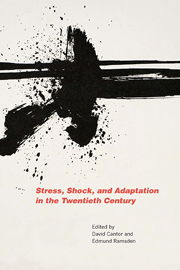Book contents
- Frontmatter
- Contents
- Acknowledgments
- Introduction
- Part One Packaging Stress
- Part Two Trauma and Acute Stress
- Part Three War
- Part Four Work
- 7 Making Sense of Workplace Fear: The Role of Physicians, Psychiatrists, and Labor in Reframing Occupational Strain in Industrial Britain, ca. 1850–1970
- 8 Work, Stress, and Depression: The Emerging Psychiatric Science of Work in Contemporary Japan
- Part Five Managing Stress
- Part Six Surveilling Stress
- List of Contributors
- Index
7 - Making Sense of Workplace Fear: The Role of Physicians, Psychiatrists, and Labor in Reframing Occupational Strain in Industrial Britain, ca. 1850–1970
from Part Four - Work
Published online by Cambridge University Press: 05 April 2014
- Frontmatter
- Contents
- Acknowledgments
- Introduction
- Part One Packaging Stress
- Part Two Trauma and Acute Stress
- Part Three War
- Part Four Work
- 7 Making Sense of Workplace Fear: The Role of Physicians, Psychiatrists, and Labor in Reframing Occupational Strain in Industrial Britain, ca. 1850–1970
- 8 Work, Stress, and Depression: The Emerging Psychiatric Science of Work in Contemporary Japan
- Part Five Managing Stress
- Part Six Surveilling Stress
- List of Contributors
- Index
Summary
The Making of a Stressful World
At the beginning of the twenty-first century, Britain's Health and Safety Executive (HSE) estimated that five million UK employees experienced “stress” as a result of their work. Stress was defined as an individual's adverse reaction to external pressures, though such personal experiences varied in similar conditions. The impact of stress included high absenteeism, increased labor turnover, poor morale, difficult labor relations, and increased risks of accidents and illness. The cost of stress-related illness reported by half a million Britons was estimated at £3.7 billion per year. Britain was only one among many developed countries swept by an epidemic of industrial stress that had become the single most important workplace illness.
The historical origins of this pandemic have recently attracted the attention of scholars, who have pointed to a growing interest in individual personality and the self during the twentieth century. This interest was encouraged in Britain by popularization of psychological ideas, the decline of older moral values, and the spread of holistic medicine during the later twentieth century. This chapter shows that the advance of such ideas was, at best, partial and that notions of stress remained fluid, fragmentary and contested throughout the century. Nowhere is this more evident than in the development of knowledge about occupational stress, which was more usually (and arguably more accurately) understood as personal strain in the century before 1970.
- Type
- Chapter
- Information
- Stress, Shock, and Adaptation in the Twentieth Century , pp. 189 - 221Publisher: Boydell & BrewerPrint publication year: 2014

